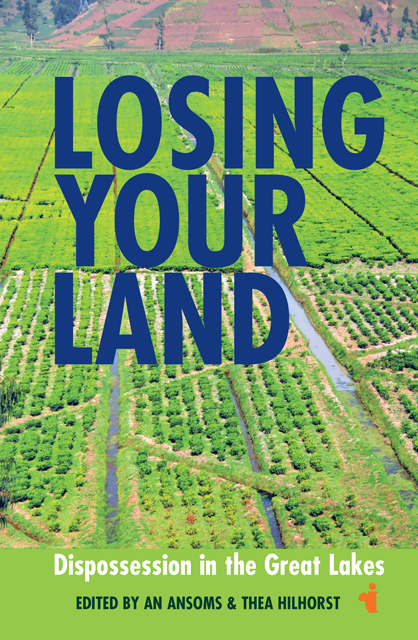Book contents
- Frontmatter
- Contents
- List of Illustrations
- Notes on Contributors
- Acknowledgements
- List of Abbreviations & Acronyms
- 1 Introduction: Causes & Risks of Dispossession & Land Grabbing in the Great Lakes Region
- 2 Land Grabbing & Development History: The Congolese Experience
- 3 This Land is My Land: Land Grabbing in Ituri (DRC)
- 4 Land Grabbing by Mining Companies: Local Contentions & State Reconfiguration in South Kivu (DRC)
- 5 Competition over Soil & Subsoil: Land Grabbing by Local Elites in South Kivu (DRC)
- 6 The Continuities in Contested Land Acquisitions in Uganda
- 7 Land Grabbing & Power Relations in Burundi: Practical Norms & Real Governance
- 8 Land Grabbing & Land Tenure Security in Post-Genocide Rwanda
- 9 The Reorganization of Rural Space in Rwanda: Habitat Concentration, Land Consolidation & Collective Marshland Cultivation
- 10 ‘Modernizing Kigali’: The Struggle for Space in the Rwandan Urban Context
- Conclusion
- Index
2 - Land Grabbing & Development History: The Congolese Experience
Published online by Cambridge University Press: 24 February 2023
- Frontmatter
- Contents
- List of Illustrations
- Notes on Contributors
- Acknowledgements
- List of Abbreviations & Acronyms
- 1 Introduction: Causes & Risks of Dispossession & Land Grabbing in the Great Lakes Region
- 2 Land Grabbing & Development History: The Congolese Experience
- 3 This Land is My Land: Land Grabbing in Ituri (DRC)
- 4 Land Grabbing by Mining Companies: Local Contentions & State Reconfiguration in South Kivu (DRC)
- 5 Competition over Soil & Subsoil: Land Grabbing by Local Elites in South Kivu (DRC)
- 6 The Continuities in Contested Land Acquisitions in Uganda
- 7 Land Grabbing & Power Relations in Burundi: Practical Norms & Real Governance
- 8 Land Grabbing & Land Tenure Security in Post-Genocide Rwanda
- 9 The Reorganization of Rural Space in Rwanda: Habitat Concentration, Land Consolidation & Collective Marshland Cultivation
- 10 ‘Modernizing Kigali’: The Struggle for Space in the Rwandan Urban Context
- Conclusion
- Index
Summary
Introduction: land grabbing and the place of the agrarian question in development studies
The literature of ‘land grabbing’ expanded at the end of the last decade. One of the most promising fields in the latest discussions is the renewal of very old research themes, such as agrarian transition and the role of enclosure in primitive accumulation (Hall, Hirsch and Li, 2011), the relationships between land use and property rights (Borras and Franco, 2012), between the role of the State, market and institutions in the access to common goods and their management, between modes of production and social relations (Bernstein 2010), and between dispossession, impoverishment and proletarianisation of small farmers (Li, 2011).
Figures revealing the extent of the threat, have added a dramatic character to these arguments. They indicate that from 2008 to 2011, between 30 and 60 million hectares were given into concession, including 20 million in Africa (Baxter, 2010; Brown, 2011). Between 2000 and 2010, the total allotted, sold or leased land would amount to more than 200 million hectares (Oxfam, 2011).
Discussions around the theme of ‘land grabbing’ have stimulated a movement of empirical research and theoretical reflection. It gives the ‘agrarian question’ a central place, while taking into account its multiple economic, social, environmental and cultural dimensions. Various studies have highlighted the multiplicity of stakeholders in North and South, the complexity of the chains of interest connecting them, and also the heterogeneity of local contexts, including the differences in attitude and behaviour between categories of actors involved.
However, despite its stimulating critical perspective, and its empirical and theoretical contributions, much of the recent research remains focused almost exclusively on the recent ‘land grabbing’ wave, as if it was a sui generis event, whose unexpected magnitude disrupts the conditions for the development of agriculture in the South, and poses a threat of an unprecedented scale for the future of the peasantry. Despite scattered references to the history of enclosure in the formation of agrarian capitalism, the historical perspective in most contemporary literature is very limited. However, when considering that historical perspective, one could state that ‘land grabbing’ is only one of the components of a very old offensive against the smallscale peasantry.
In the next part, we point to the importance of such historical perspective in the case of the DRC (Democratic Republic of Congo).
- Type
- Chapter
- Information
- Losing your LandDispossession in the Great Lakes, pp. 11 - 35Publisher: Boydell & BrewerPrint publication year: 2014
- 8
- Cited by



